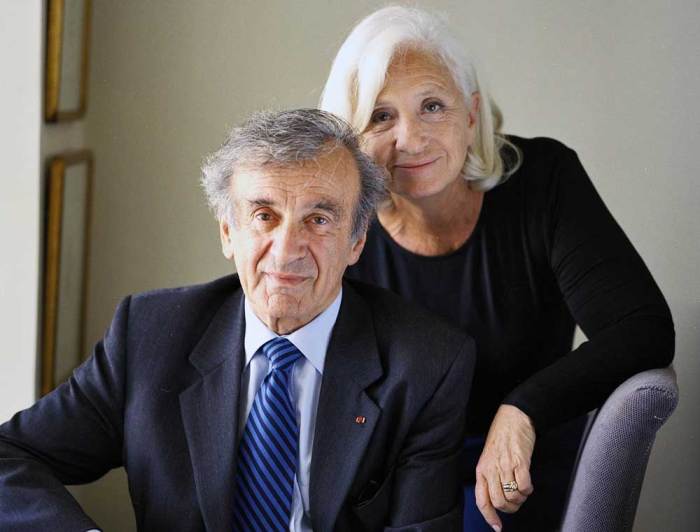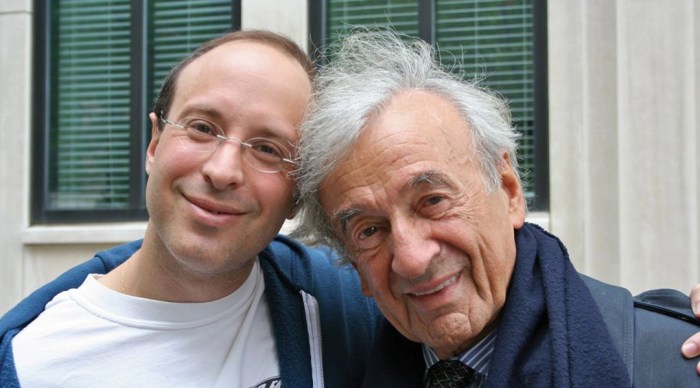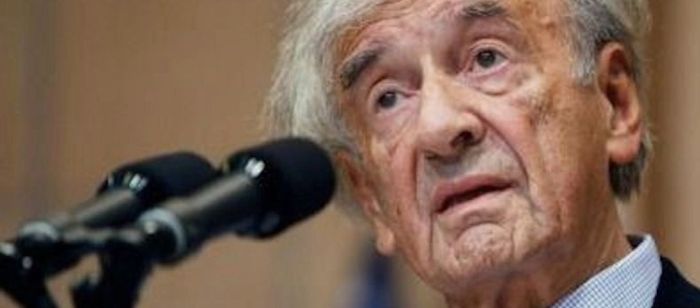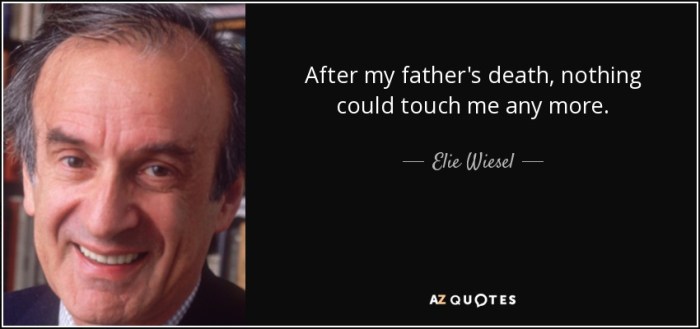Elie wiesel and his father – In the annals of Holocaust literature, Elie Wiesel’s relationship with his father stands as a beacon of unwavering faith, resilience, and literary inspiration. This narrative delves into the profound impact his father’s presence had on Wiesel’s life and work, exploring the complexities of their bond amidst the horrors of Auschwitz.
As we embark on this journey, we will uncover the events that shaped Elie Wiesel’s childhood, the harrowing experiences he endured in the concentration camp, and the ways in which his father’s example shaped his literary legacy.
Elie Wiesel’s Early Life and Family Background

Elie Wiesel was born on September 30, 1928, in Sighet, Transylvania, Romania, which was then part of Hungary. His father, Shlomo Wiesel, was a devout Hasidic Jew who worked as a watchmaker. His mother, Sarah Feig, was a homemaker. Elie had three older sisters: Hilda, Beatrice, and Tzipora.
Elie’s father was a great influence on his early development. Shlomo Wiesel was a deeply religious man who believed that studying the Torah was the most important thing in life. He was also a skilled craftsman who taught Elie the value of hard work.
Elie’s mother was a loving and supportive woman who encouraged her children to pursue their dreams.
Religious Beliefs
Elie’s father was a devout Hasidic Jew. Hasidic Judaism is a branch of Orthodox Judaism that emphasizes joy, mysticism, and the importance of a personal relationship with God. Elie’s father believed that the Holocaust was a punishment from God for the sins of the Jewish people.
He also believed that the only way to survive the Holocaust was to remain faithful to God.
Influence of Father
Elie’s father had a profound influence on his son’s life. He taught Elie the importance of religion, hard work, and family. He also taught Elie to never give up hope, even in the face of adversity. Elie’s father was a role model for him, and he helped Elie to become the man he was.
Elie Wiesel’s Experiences during the Holocaust: Elie Wiesel And His Father

The Holocaust, a horrific genocide perpetrated by the Nazi regime, left an indelible mark on Elie Wiesel’s life. His experiences in the concentration camps shaped his worldview and fueled his lifelong dedication to fighting against hatred and intolerance.
Arrival at Auschwitz
In 1944, Elie Wiesel and his family were forcibly deported from their home in Sighet, Transylvania, to the Auschwitz concentration camp. Upon arrival, they were separated, with Elie and his father sent to the men’s camp while his mother and sisters were sent to the women’s camp.
Life in the Concentration Camp
Life in Auschwitz was a daily struggle for survival. Elie and his father endured starvation, disease, and the constant threat of violence. They witnessed unspeakable horrors, including the mass murder of countless prisoners in the gas chambers.
Despite the unimaginable suffering, Elie and his father clung to each other for support. Elie’s father, a deeply religious man, provided him with spiritual guidance and helped him maintain his faith amidst the darkness.
Elie Wiesel and his father shared a powerful bond despite the horrors they endured in the Holocaust. Their relationship is a testament to the resilience of the human spirit. To learn more about their story and its significance, check out the unit 5 progress check frq . It provides insights into the complex relationship between Elie and his father, as well as the broader themes of suffering, hope, and the importance of human connection.
The Impact of the Holocaust
Elie Wiesel’s experiences during the Holocaust profoundly impacted his life and work. He became a tireless advocate for human rights and a vocal opponent of all forms of tyranny.
Through his writing, lectures, and activism, Elie Wiesel shared his firsthand account of the horrors of the Holocaust, hoping to educate future generations and prevent such atrocities from ever happening again.
Elie Wiesel’s Father as a Symbol of Faith and Resilience

In the face of unspeakable horrors, Elie Wiesel’s father, Shlomo, emerged as a beacon of faith and resilience. His unwavering belief in God sustained him and his son through the darkest depths of the Holocaust.
Shlomo’s Unwavering Belief in God
Despite the unimaginable suffering they endured, Shlomo’s faith never wavered. He clung to his prayers, reciting the Shema daily, even in the most desolate conditions. His belief in God’s presence provided him with a sense of purpose and hope amidst the despair.
Shlomo’s Example as an Inspiration to Elie Wiesel
Elie Wiesel witnessed his father’s unwavering faith firsthand, and it became a source of inspiration for him. Shlomo’s resilience taught him the importance of perseverance and the power of hope. Even after the Holocaust, Elie Wiesel continued to fight against injustice and advocate for human rights, driven by the example of his father’s faith and determination.
Elie Wiesel’s Literary Legacy and the Influence of His Father

Elie Wiesel’s experiences with his father profoundly shaped his literary work, which explored themes of fatherhood, faith, and the Holocaust. His father, Shlomo, served as a symbol of resilience and faith in the face of unimaginable horrors.
The Influence of His Father’s Faith
Wiesel’s father’s unwavering faith in God provided a source of strength and hope during the Holocaust. In his memoir “Night,” Wiesel describes how his father’s faith sustained him through the darkest moments of their imprisonment.
“My father’s faith was a flame in the darkness. It kept us alive, it gave us hope.”
Wiesel’s portrayal of his father’s faith serves as a testament to the power of belief in the face of adversity.
The Legacy of His Father’s Resilience, Elie wiesel and his father
Shlomo Wiesel’s resilience and determination to survive inspired Elie Wiesel’s literary work. In “Night,” Wiesel recounts how his father endured unimaginable hardships and never lost his will to live.
“My father was a tower of strength. He refused to give up, even when all hope seemed lost.”
Wiesel’s portrayal of his father’s resilience underscores the importance of perseverance and the human spirit’s ability to overcome adversity.
Impact on Readers Worldwide
Elie Wiesel’s writings have had a profound impact on readers around the world. His works have raised awareness of the Holocaust, promoted tolerance, and inspired countless individuals to fight against injustice.
“Wiesel’s words have the power to move and inspire. They remind us of the horrors of the past and the importance of fighting for a better future.”
Wiesel’s literary legacy continues to serve as a powerful reminder of the human capacity for both darkness and redemption.
Elie Wiesel’s Father as a Role Model for Holocaust Survivors

Elie Wiesel’s father, Shlomo, played a pivotal role in his son’s life, both during the Holocaust and in the years that followed. Shlomo’s unwavering faith, resilience, and love served as a beacon of hope for Elie and countless other Holocaust survivors.
The Power of Faith
Despite the horrors they endured, Shlomo clung steadfastly to his belief in God. He found solace in prayer and ritual, drawing strength from his faith even in the darkest of times. His unwavering devotion inspired Elie and others to find hope and meaning amidst the despair.
The Importance of Resilience
Throughout the Holocaust, Shlomo exhibited extraordinary resilience. He refused to give up, even when faced with unimaginable suffering and loss. His indomitable spirit taught Elie the importance of perseverance and the ability to overcome adversity.
The Strength of Love
Shlomo’s love for his family and fellow prisoners was a constant source of strength for Elie. His compassion and kindness reminded Elie that even in the face of evil, human connection and love could endure.
Preserving and Sharing Holocaust Stories
Elie Wiesel dedicated his life to sharing the stories of Holocaust survivors. He believed that it was essential to preserve the memory of the Holocaust so that future generations would learn from the mistakes of the past. Shlomo’s story, and the stories of other survivors, serve as a powerful reminder of the horrors of war and the importance of fighting against intolerance and hatred.
FAQ Section
What was Elie Wiesel’s father’s occupation?
Elie Wiesel’s father, Shlomo Wiesel, was a shopkeeper.
How did Elie Wiesel’s experiences in Auschwitz affect his relationship with his father?
Elie Wiesel’s experiences in Auschwitz strained his relationship with his father, as he witnessed his father’s suffering and questioned his faith.
What was the significance of Elie Wiesel’s father’s unwavering belief in God?
Elie Wiesel’s father’s unwavering belief in God served as a source of strength and inspiration for him, even amidst the horrors of Auschwitz.
How did Elie Wiesel’s father influence his literary work?
Elie Wiesel’s father’s experiences and unwavering faith heavily influenced his literary work, particularly in exploring themes of faith, resilience, and the Holocaust.